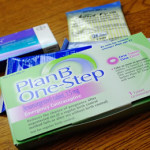Does Plan B (Morning-after Pill) Affect Menstrual Cycle?
Morning-after or medically called as emergency contraception (such as Plan B One-step) is a kind of birth control that can be used for emergency situations. The effectiveness and how soon you should take the pill is dependent on the kind of the pill. Since most of these pills can affect your hormonal levels, they can affect your menstrual cycle.
There are some conditions that can be a reason why you need to take this option. But in general, emergency contraception is one of options you can try when a pregnancy is not expected.
The following are some common reasons why you may need to take it:
- After doing the intercourse, but you don’t use any birth control, and you are not expecting a pregnancy.
- You forget to take your birth control pills.
- You or your partner use a barrier method (like condom) to prevent pregnancy, but this barrier slip out of place or breaks.
- After getting accidental intercourse, such as after being raped.
However it should be only used for emergency situations, as the name implies. In other words, it is commonly not recommended to be used for a regular method of birth control [1]!
Fortunately, there are now some pills that have been approved by the FDA. So, you can use them safely – at least, they have evidence backing them up that they are safe and also do work to help prevent pregnancy in emergency situations.
Currently, there are 3 popular morning-after pills that have been approved by the FDA. They are: Plan B One-Step, Next-Choice, and Ella.
The use of Ella must with a prescription form a doctor. But for Plan B One-Step and Next Choice, they can be used for women age 17 years-old or older without prescription.
But for women /girls younger than 17 years-old, the use of Next Choice or Plan B One-Step must be discussed first with a doctor or with prescription.
Plan B One-Step, Next-Choice, and Ella have the difference instructions on how soon you should take the pill. Here are some common guidelines of how to use them [2]:
- If you choose to use Plan B one-step, it must be taken less than 72 hours after intercourse.
- If you use Next-Choice, it is instructed to be taken in 2 doses. The first pill must be taken less than 72 hours after intercourse, and then you need take the second pill about 12 hours later!
- And if you decide to use Ella, it must be taken less than 120 hours after intercourse!
Overall, you need to take the pill as soon as possible after unprotected intercourse. For more detailed information, read the instructions carefully.
In addition – If you take Plan B One-Step, it may not harm a fetus and also doesn’t affect an existing pregnancy. But if you use Ella, this can be potential to harm a fetus – though the effect of Ella for existing pregnancy is still not fully understood.
But to keep safe, the use of emergency contraception is not too recommended if you believe that you are being pregnant.
According to some studies, Ella can work more effectively than others in reducing the chance of getting a pregnancy after unprotected intercourse. However, Plan B one-step and Next-Choice also work effective if taken as instructed.
But if you are looking for a better option to optimally reduce your chance of becoming pregnant after intercourse without birth control, you can consider taking IUS (intrauterine devices). It can provide about 99 percent effective when inserted less than 7 days after intercourse [3].
In general, most pills for emergency contraception can temporarily affect the way of your body in releasing egg (ovulation). If you do the intercourse and there is still no mature egg released from your ovaries, the pill can prevent the ovulation.
 And if you do the intercourse during ovulation, there is chance for the egg to be fertilized by sperm. But don’t worry!
And if you do the intercourse during ovulation, there is chance for the egg to be fertilized by sperm. But don’t worry!
The pills for emergency contraception are also designed to prevent n fertilized egg to be implanted in the endometrium (the thickened uterus that has been prepared by the female body during the first half of menstrual cycle).
However for your best chance of preventing unexpected pregnancy, you should not do the intercourse with your partner at the days of your ovulation. It is the basic natural formula for birth control.
The morning-after pill such as ‘Plan B one-step’ can prevent ovulation and also prevent a fertilized egg from becoming implanted in the female uterus, and these mechanisms can affect your hormonal levels. As a result, you may notice your next period earlier or later than usual [1].
The next question, when your next period will come after taking morning-after pill?



